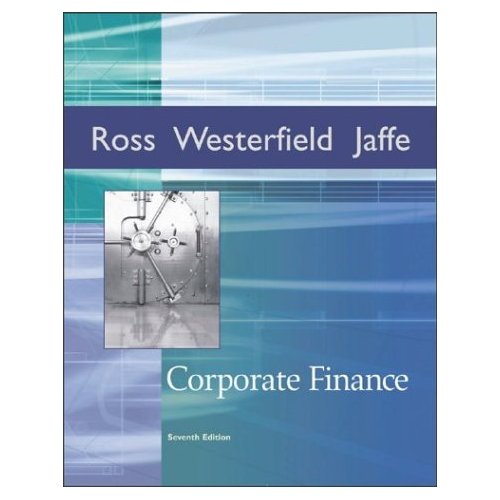Corporate Finance, 7th edition + Student CD-ROM
Specifications
- 0072971231 ISBN-10:
- 0072971231 Contents same as book with ISBN
- 007059788X ISBN
- New Condition
- Paperback, Printed in Grayscale Media
- 1 business day Generally Ships in
- International Edition Media
- 24/24 Online
- Yes High Speed
- Yes Protection
- In Stock soon, order now to reserve your copy.
- FREE DELIVERY
Description
Excelling in your corporate finance course means not just relying on a reputable author team, it means using the tools and support that they have crafted for you. Corporate Finance offers you clear and refined content as well as dynamic learning tools that will boost your understanding and complement you in-class work. the key revisions and updates to this edition include: significant reorganization and expanded contents of financial accounting, cash flow and growth; new chapter on risk analysis and real options; incorporates the latest theoretical developments in capital budgeting, capital structure and dividends throughout some chapters; new problems added in most chapters. This book has been written for the introductory courses in corporate finance at the MBA level and for the intermediary courses in many undergraduate programs.
Table of Contents
Part I: Overview
Chp.1 Introduction to Corporate Finance
Chp.2 Accounting Statements and Cash Flow
Part II: Value and Capital Budgeting
Chp.3 Long Term Financial Planning and Growth
Chp.4 Net Present Value
Chp.5 How to Value Bonds and Stocks
Chp.6 Some Alternative Investment Rules
Chp.7 Net Present Value and Capital Budgeting
Chp.8 Strategy and Analysis in Using Net Present Value
Part III: Risk
Chp.9 Capital Market Theory: An Overview
Chp.10 Return and Risk: The Capital-Asset-Pricing Model
Chp.11 An Alternative View of Risk and Return: The Arbitrage Pricing Theory
Chp.12 Risk,Cost of Capital, and Budgeting
Part IV: Capital Structure and Dividend Policy
Chp.13 Corporate Financing Decisions and Efficient Capital Markets
Chp.14 Long Term Financing: An Introduction
Chp.15 Capital Structure: Basic Concepts
Chp.16 Capital Structure: Limits to the Use of Debt
Chp.17 Valuation and Capital Budgeting for the Levered Firm
Chp.18 Dividend Policy: Why Does It Matter?
Part V: Long Term Financing
Chp.19 Issuing Securities to the Public
Chp.20 Long Term Debt
Chp.21 Leasing
Part VI: Options, Futures,and Corporate Finance
Chp.22 Options and Corporate Fiance: Concepts
Chp.23 Options and Corporate Fiance: Extensions and Applications
Chp.24 Warrants and Convertibles
Chp.25 Derivatives and Hedging Risk
Part VII: Financial Planning and Short Term Finance
Chp.26 Short term Finance and Planning
Chp.27 Cash Management
Chp.28 Credit Management
Part VIII: Special Topics
Chp.29 Mergers and Acquisitions
Chp.30 Financial Distress
Chp.31 International Corporate Finance
About the Authors





